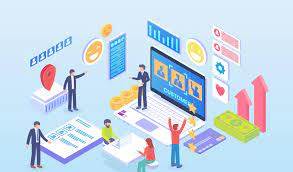Running an effective organization necessitates expertise, talents, and business acumen, but most importantly, prudent management of business processes and utilization of the benefits of enterprise resource planning. Because modern marketplaces are so competitive, entrepreneurs must grab every possible opportunity, including technical breakthroughs, to maximize efficiency and stay ahead of the competition.
ERP systems have long established their supremacy in the world of corporate software solutions. This article will describe the cause of this phenomena by describing the ERP benefits and answering the legitimate question 'what are the downsides of ERP?'
Why is ERP Important?
As previously said, business resource planning software provides numerous great prospects that can be turned into financial benefits by a skilled individual. So, let's go right to the point and look at the potential benefits of enterprise systems.
1. Improved management performance
ERP solutions act as a data center, connecting all areas of corporate activities that require management, such as human resources, production, sales, customer service, inventory, and supply. ERP software uses computer technologies to automate data management in the most efficient and effective manner possible.
2. Improved information accuracy and availability
This is the main benefit that affects all of the other business resource planning benefits described in this list in some way. Advanced ERP systems, for example, provide for the effective and centralized gathering, processing, and storage of information on production, sales, supply, or customers.
As a result, instead of a number of distinct databases that require regular inspections and synchronization to delete obsolete or duplicate records, a single data system is used and maintained.
3. Better coordination
The unified system, which contains all business-related data, enhances collaboration among enterprise branches or departments. ERP software decreases communication delays throughout the organization, increasing productivity. This is especially useful if a corporation has a distributed network of affiliates across multiple states or even continents.
4. Exact planning
The easy access to the majority of business information substantially simplifies its analysis in order to establish a future development path. The aggregated data can be used more effectively by the company's management and business analysts to develop new strategies or suggest modifications to existing ones.
5. Improved reports
ERP software provides a pleasant environment for rapid and easy submission of all types of reports: from financial to inventory, from consumer behavior to technical maintenance, and so on, as a result of reduced paperwork and enhanced communication across departments.
6. Flexibility and scalability
Another intrinsic feature of ERP software is its modular nature, which allows it to be scaled according to current demands and situations. Because of this capability, a resource planning system may readily adjust to the company's development or reduction on all levels.
7. Value for money
ERP systems provide cost-cutting on administrative demands by reducing paperwork and optimizing everyday routines, most notably by reducing repeated jobs. Furthermore, resource planning solutions significantly accelerate corporate activities involving a variety of information requests and approvals, such as logistics, stock and supply management, and others.
8. More convenient access to management systems
ERP systems can be implemented as web or mobile applications supplemented with cloud technology to meet unique resource planning demands. They can then be accessible at any time and from practically any location by running on cell phones, laptops, or other portable devices.
9. Better customer service
Another practical advantage of modern ERP software is improved client relationship management. A centralized data storage system collects all relevant information on sales and clientele, making it easier for sales managers and customer support employees to engage with clients and shortening the time it takes to respond to consumer requests.
10. Increased market competitiveness
This final benefit is a summation of all of the preceding benefits, relayed in terms of business profits. The objective is that ERP systems provide the organization with a much-needed competitive advantage, providing an additional tool to surpass competitors. While some firms stick to tried-and-true techniques or simply cannot afford ERP solutions, others capitalize on technology improvements and reap the benefits.




Leave Comment